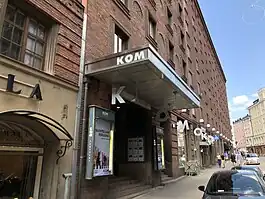
KOM-teatteri (transl. KOM-theater) is a theater founded in 1971 in Ullanlinna, Helsinki. Before its founding, it operated as an independent group for one year at the Swedish Theatre in 1970/1969.[1] It was one of the major names of the leftist political song movements of the 1970s, which influenced Finnish politics, together with Agit-prop. KOM-teatteri has released a total of 12 total albums, which during the 1970s mostly consisted of leftist or Industrial folk music.[2] It is primarily a drama theater today, with the occasional has various concerts or progams.[3][4]
History

The theater began it's existence as a autonomous group within the Swedish Theater, which was quite conservative compared to KOM-teatteri who wished to revolutionize the theater industry. The name KOM-teatteri comes from the word "Kom" (transl. Come) and a stylization of "Kommunismi" (transl. Communism). The group however was forced to use Swedish within its art and was made to water down it's leftist agenda. One of the major goals of the revolution within the theater industry was to "democratize" art, and after self-declared financial issues, the group became independent in 1971.[4][5]
The theater was originally started as a Touring theatre as the group wished to reach a more wide audience, going on tour in the Finnish countryside and in Finnish-speaking regions of Sweden. The group still performs occasionally on tours around Finland,[6] performing more drama and literature than music.[7] The group is the oldest independent theater group in Finland.[8][9][10]
In 1999 KOM-teatteri won the "Theater of the Year Award" By Suomen Teatterit.[11]
The theater group has been in often cooperation and contact with Yle and has had shows such as the Estradilla: KOM-teatteri 35 v (transl. On the Dais: KOM-theater 35 Years), which was broadcast on Yle TV2's Estradilla series in December 2007, and in 2023, Yle Areena made a documentary on KOM-teatteri for the theater's 52nd birthday.[12] These programs have been all run at the Kulttuuritalo in Helsinki since 2006, with the first program on KOM-teatteri called Porvari valvoo.[13]
Physical Location
The physical building is a red brick building with around 300 seats at Kapteeninkatu, which was not acquired by the group until 1978.[7][14] Before this the group did not have a set location until 1977, when they got their own stage at Hämeentie 68 in 1977.[6]
The building has a stage room, Ravintola Pontus (formerly KOM-restaurant)[15] and a lobby.
Albums[16]
- Porvari nukkuu huonosti (1971)
- Kansainvälinen (1972)
- Torpedo (1973)
- Kaikki muuttuu (1974)
- Älä tuhlaa aikaa (1975)
- Vapauden kaiho (1979)
- Haittaako järki (1985)
- On matkaa jatkettava (1986)
- Jokaisella on tämänsä (1987)
- Lähtö ja kaipaus (1988)
- Jokaisella on tämänsä (1988)
- Tuulisella terassilla (1991)
- KOM-teatterin joulu (2003)
- 35 vuotta lauluja (2006)
References
- ↑ "KOM-teatteri - Suomen Teatterit".
- ↑ "Untitled Document". 2007-09-27. Archived from the original on 2007-09-27. Retrieved 2023-07-29.
- ↑ "Stadissa.fi". Stadissa.fi (in Finnish). Retrieved 2023-08-25.
- 1 2 Nagy, Peter; Rouyer, Philippe (2014-10-03). World Encyclopedia of Contemporary Theatre: Volume 1: Europe. Routledge. ISBN 978-1-136-11804-3.
- ↑ Johnson, Jeff (2010-03-16). The New Finnish Theatre. McFarland. ISBN 978-0-7864-5671-0.
- 1 2 "Sök - Uppslagsverket Finland". www.uppslagsverket.fi. Retrieved 2023-08-25.
- 1 2 "Untitled Document". 2007-09-27. Archived from the original on 2007-09-27. Retrieved 2023-08-24.
- ↑ "Suomalaisia ja kaupunkilaisia teattereita". Kotimaisten kielten keskus (in Finnish). Retrieved 2023-08-24.
- ↑ "KOM-teatteri | Teatterimatka.fi" (in Finnish). 2016-09-30. Retrieved 2023-08-24.
- ↑ "Sök - Uppslagsverket Finland". www.uppslagsverket.fi. Retrieved 2023-08-25.
- ↑ "Palkinnot - Suomen Teatteri".
- ↑ "KOM-teatteri - maailma muuttuu, herkkyys säilyy | Yle Areena". areena.yle.fi (in Finnish). Retrieved 2023-08-24.
- ↑ Vuori, Suna (2006-01-16). "Paljon terveisiä porvarille". Helsingin Sanomat (in Finnish). Retrieved 2023-08-24.
- ↑ "KOM-teatteri". My Helsinki (in Finnish). Retrieved 2023-08-24.
- ↑ "Stadissa.fi". Stadissa.fi (in Finnish). Retrieved 2023-08-25.
- ↑ "Untitled Document". Retrieved 2023-07-29.